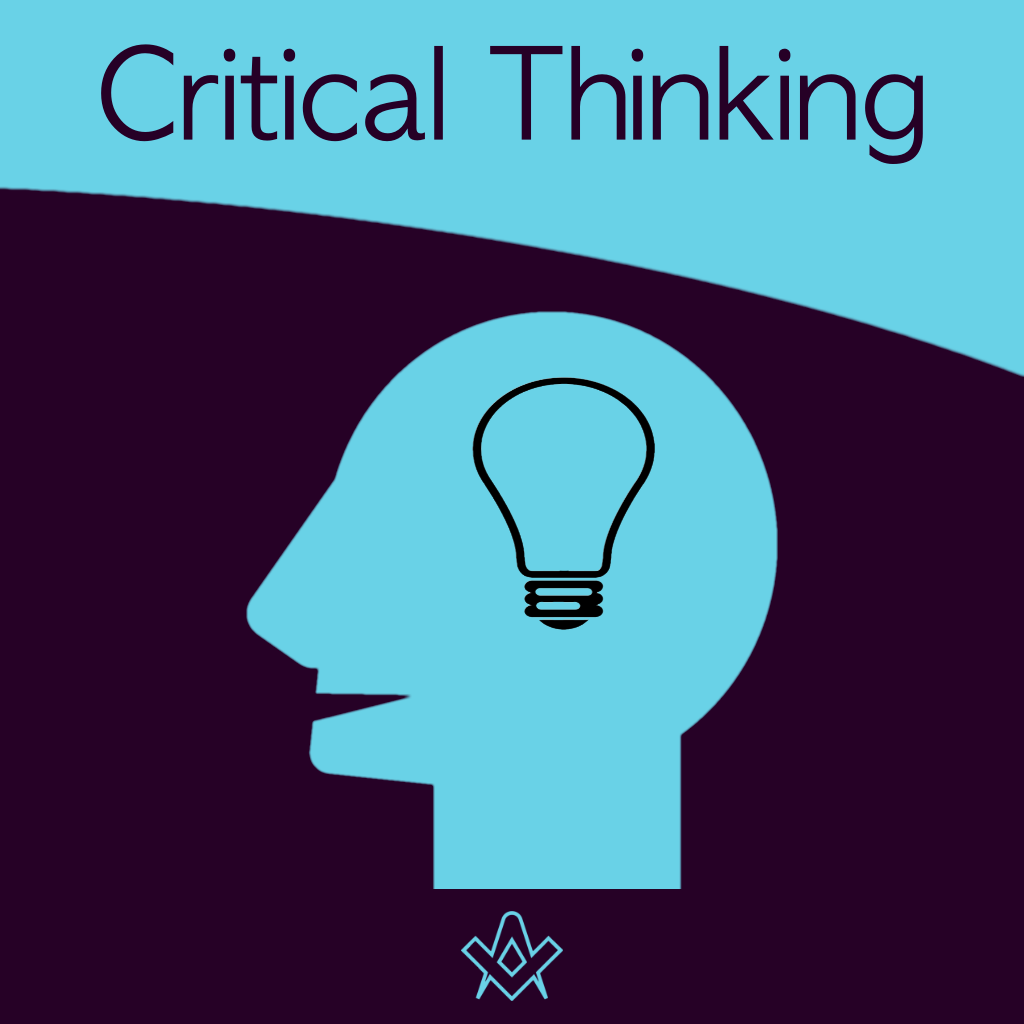You may wonder why we often mention the Seven Liberal Arts.
To most people they represent a form of ancient learning that only privileged folk were privy to – but that is where you are mistaken.
In the previous article Seven Liberal Arts, we looked at some explanations of three widely asked questions – why ‘seven‘, why ‘liberal‘ and why ‘arts‘?
Three short videos explain these questions simply and concisely.
So, now you know what they are but do you know what can you do with them?
It may look complicated and ‘antiquated‘ at first but as with all things, the explanations and applications can be broken down into bite-size chunks.
Firstly, we have the Trivium which is the first group of arts, unsurprisingly relating to ‘three’ subjects – ‘trivium’ means ‘three paths’.
Grammar is the art of inventing symbols and combining them to express thought; logic is the art of thinking; and rhetoric is the art of communicating thought from one mind to another, the adaptation of language to circumstance. — Sister Miriam Joseph, The Trivium: The Liberal Arts of Logic, Grammar, and Rhetoric (2002)
The Trivium teaches us: How to think, not what to think
- Grammar: the study of words, language and communication – the art of combining letters, sounds and words; defining and establishing the norms of words and language. This all relies on input – data or information gathering without prejudice or bias – ‘Who’, ‘What’, ‘Where’, ‘When’.
- Logic: the study of reasoning – the art of thinking and sorting information; the analysis and appraisal of arguments; validating the premise and conclusion. It is the processing, analysis and understanding – of having curiosity and sound reasoning – the ‘Why’?
- Rhetoric: the study and art of communication/persuasive reasoning – it is the culmination of mastering the previous two arts of Grammar – communication, and Logic – thinking. This allows us to express a logic-based thesis, concept or idea – the ‘How’.
It is a given that the Trivium arts are to be studied before moving onto the Quadrivium – for medieval students of the liberal arts, it was the equivalent of an undergraduate course.
The Quadrivium – ‘four’ arts – it’s all about numbers and the study of pattern recognition in science and nature:
- Arithmetic: the study of numbers
- Geometry: the study of numbers in space
- Music: the study of numbers in time/interval (harmony/ratio)
- Astronomy: the study of numbers in space and time
This is a superb video by Suburban Homestead Outfitters, which simply and eruditely sums up how we can use the seven liberal arts in the methodology of critical thinking.
In the video the presenter makes the crucial point that: ‘today instead of a logic-based culture, we have become an emotional-based culture subject to the influence of carefully crafted manipulation designed to target primal desires and emotions over our intellect’.
This is something we are faced with on a daily or even hourly basis when we watch the news, read a paper or magazine, or scroll through social media – every headline, every post, every Twitter feed, is guaranteed to elicit a response.
We spend a vast amount of our lives these days in a heady mix or confusion, frustration, anger, or just plain feeling offended.
Often we don’t even read the article/post or listen to the full report because our primal emotion-based brain has already gone into full flow.
We are not engaging critical thinking, or if we are, we may then be employing confirmation bias, logical fallacies, or cognitive dissonance and we end up having conflicting or biased assumptions (and feelings!) OK, too many confusing words?
Confirmation bias: the tendency to interpret new evidence as confirmation of one’s existing beliefs or theories.
Cognitive dissonance: the state of having inconsistent thoughts, beliefs, or attitudes, especially as relating to behavioural decisions and attitude change.
Cognitive bias: an umbrella term that refers to the systematic ways in which the context and framing of information influence individuals’ judgment and decision-making.
source: https://www.interaction-design.org/literature/topics/cognitive-biases
So, how do we learn to make sound judgements from the information we are given?
Critical Thinking – the objective analysis and evaluation of an issue in order to form a judgement.
- Gather your data – without prejudice/bias – whether that is the written word or through speech/language (Grammar)
- Analyse and sort the data – eliminate contradiction and cross-reference to identify facts (Logic)
- Express effectively what has been gathered, analysed, and validated in a logical-based explanation (Rhetoric)
So, as an example of how to combine the Trivium lessons – if I wanted to give a lecture, I would:
- Research my subject, gathering information from books, articles, research papers etc; talking to others or watching/listening to media (Grammar)
- Sort through all that information, analyse it to find out which of it is factual or mere conjecture. I would cross-reference and validate my findings, thus ensuring a result free from any biases or fallacies (Logic)
- Finally after gathering and analysing my data (combining 1 & 2 above), I can give a factual, logic-based, organised speech, with a sound premise and conclusion (Rhetoric)
Studying and applying the liberal arts can help you in daily life, be it work, study, finances, and relationships. They can teach you how to:
- ask good questions
- formulate good answers
- conduct research and organize that material effectively
- write and communicate effectively
- be creative in thinking and doing
- problem solve – use pattern recognition and numerical skills
- engage in critical and reflective reading skills
- give constructive feedback and criticism
- analyse information and data without bias
- make your point clearly and coherently
- be respectful of others’ viewpoints
- have independent judgement
- make ethical decisions
- manage time, meet goals and deadlines, complete projects
- be self-confident and independent
Remember – knowledge (arts) can set you free (libre)!
Article by: Philippa Lee. Editor

Philippa Lee (writes as Philippa Faulks) is the author of eight books, an editor and researcher.
Philippa was initiated into the Honourable Fraternity of Ancient Freemasons (HFAF) in 2014.
Her specialism is ancient Egypt, Freemasonry, comparative religions and social history. She has several books in progress on the subject of ancient and modern Egypt. Selection of Books Online at Amazon


Quadrivium: The Four Classical Liberal Arts of Number, Geometry, Music, & Cosmology
The quadrivium-the classical curriculum-comprises the four liberal arts of number, geometry, music, and cosmology.
It was studied from antiquity to the Renaissance as a way of glimpsing the nature of reality. Geometry is number in space; music is number in time; and cosmology expresses number in space and time.
Number, music, and geometry are metaphysical truths: life across the universe investigates them; they foreshadow the physical sciences.
Quadrivium is the first volume to bring together these four subjects in many hundreds of years.
Composed of six successful titles in the Wooden Books series-Sacred Geometry, Sacred Number, Harmonograph, The Elements of Music, Platonic & Archimedean Solids, and A Little Book of Coincidence-it makes ancient wisdom and its astonishing interconnectedness accessible to us today.

The Trivium:
The Liberal Arts of
Logic, Grammar, and Rhetoric
Who sets language policy today? Who made whom the grammar doctor? Lacking the equivalent of l’Académie française, we English speakers must find our own way looking for guidance or vindication in source after source.
McGuffey’s Readers introduced nineteenth-century students to “correct” English. Strunk and White’s Elements of Style and William Safire’s column, “On Language,” provide help on diction and syntax to contemporary writers and speakers.
Sister Miriam Joseph’s book, The Trivium: The Liberal Arts of Logic, Grammar, and Rhetoric, invites the reader into a deeper understanding—one that includes rules, definitions, and guidelines, but whose ultimate end is to transform the reader into a liberal artist.
A liberal artist seeks the perfection of the human faculties. The liberal artist begins with the language arts, the trivium, which is the basis of all learning because it teaches the tools for reading, writing, speaking, and listening.
Thinking underlies all these activities. Many readers will recognize elements of this book: parts of speech, syntax, propositions, syllogisms, enthymemes, logical fallacies, scientific method, figures of speech, rhetorical technique, and poetics.
The Trivium, however, presents these elements within a philosophy of language that connects thought, expression, and reality.

The Elements of Rhetoric —
How to Write and Speak Clearly and Persuasively:
A Guide for Students, Teachers, Politicians & Preachers
The Elements of Rhetoric offers a concise, comprehensive course in the rules for making your point stick.
With copious examples from such masters of language as Cicero, Augustine, Shakespeare, Erasmus, Lincoln, Dickens, Newman, Chesterton, and Lewis, you will discover the 26 rules of persuasion and learn to apply them.
Among the Elements you’ll find:
–The three modes of persuasion
–How to structure an academic essay
–How to spot and avoid logical fallacies
–How to compose with literary figures
–Practical tips for improving speed in composition
–A Study Guide with exercises
This is the essential guide to persuasive writing and speaking, in the tradition of Strunk and White’s The Elements of Style.

The Trivium in College Composition and Reading
Full facsimile of the original edition, not reproduced with Optical Recognition Software.
The “Trivium” is a systematic method of critical thinking for deriving certainty from any information coming into the mind via the five senses.
In medieval universities, the Trivium comprised the three subjects that were taught first, specifically in this order: grammar, logic and rhetoric.
While most textbooks are lucky to enjoy a shelf life of three or four years, “The Trivium” followed a different path.
In 1947, when Columbia University Press published her celebrated dissertation, “Shakespeare’s Use of the Arts of Language,” Sister Miriam Joseph’s previously published textbook gained wider notice.
And since then, The “Trivium” continues to be rediscovered by new generations of writers and teachers.
This dense, authoritative textbook takes all of Aristotle’s teachings on logic, grammar, and rhetoric, and some of his teachings of poetics, adds some of the insights gained in the subsequent centuries, and presents it in a well-organized flow.
Recent Articles: skills
 7 Soft Skills Taught In Freemasonry Discover how Freemasonry nurtures seven irreplaceable soft skills—collaboration; Communication, Teamwork, Empathy, Flexibility, Conflict Resolution, Active Listening, and Trustworthiness. Explore how these essential human attributes, grounded in emotional intelligence and ethical judgment, remain beyond the reach of AI. |
 Freemasonry and Reskilling in the age of AI The article explores the challenges and strategies organizations face in reskilling their workforce in the era of automation and artificial intelligence. It highlights the need for companies to view reskilling as a strategic imperative and involve leaders and managers in the process. The article also emphasizes the importance of change management, designing programs from the employee's perspective, and partnering with external entities. |
 Ten Central Commandments or Principles of Freemasonry Embrace the wisdom of Freemasonry's teachings in your personal journey towards self-improvement and stronger leadership. By upholding virtues of integrity, compassion, and respect, and uniting these with a commitment to continuous learning and social responsibility, inspire change. Transform yourself and the world around you, fostering a legacy of positivity and enlightenment. |
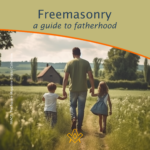 Freemasonry: A Guide to Fatherhood In the sacred halls of Freemasonry, fathers discover a hidden power to transform their parenting journey. With its timeless values, supportive community, and life-enriching teachings, Freemasonry empowers fathers to provide a moral compass, foster self-improvement, build stronger connections, and embrace the confidence and wisdom needed to navigate the complex realm of fatherhood. |
 Courage as a core value in Freemasonry Freemasonry, a revered fraternity, prioritizes virtues like honesty and charity. However, courage is foundational. From Plato to Maya Angelou, courage is vital for other virtues. Freemasonry's teachings, referencing events like Gettysburg, emphasize diverse courage forms. In today's divided world, Masons promote and exemplify courage, understanding its importance in facing challenges. |
 How Freemasonry Cultivates Ideal Entrepreneurial Traits Freemasonry's cryptic rituals hold timeless lessons for building entrepreneurial greatness. Through tests of passion, vision and skill, Masonic teachings forge ideal traits like grit, creativity and alliance-making needed to seize opportunity and elevate enterprises. The right commitment unlocks code for entrepreneurial success. |
 What you see praiseworthy in others "What you see praiseworthy in others, carefully imitate, and what in them may appear defective, you will in yourself amend". This passage of Masonic ritual (Taylors Working, Address to the w |
 How to Learn Ritual with a Learning Disorder So what do you do when faced with that little blue book? Most Masons when first looking at the ritual book can understandably be fazed – the tiny print, the missing words, the questions and answers! Learning ritual can be a challenging task for anyone, especially individuals with learning disorders, but it is not impossible. Here are some tips to help make the process easier. |
 A "mind palace", also known as a "memory palace", is a technique for memorizing and recalling information. How would your life change if you could remember anything and everything? Discover the 'Mind Palace' and all will be revealed. |
 What is leadership and who does freemasonry help develop those skills needed to be a better leader |
 A story of the 'Ruffians' – those individuals whose paths cross ours, who feel entitled to seize and consume the property of others that they have not earned. A lesson to build character to be a better citizen of the world. |
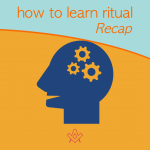 Now we are back in the Lodge room once again, maybe it is time to review how we learn and deliver ritual and look at different ways of improving that process. |
 Making an advancement in Masonic Knowledge can become far easier when you 'learn how to learn'. |
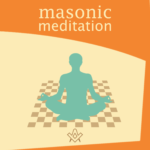 Learn how to practise Masonic meditation in a busy world with all its care and employments |
 Struggling to learn your ritual? Become a 5-Minute Ritualist with the aid of a book of the same name. |
 Day in the life of a Freemason As we start a new year, maybe start it with a new habit? |
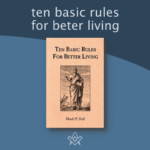 Ten Basic Rules For Better Living Ten Basic Rules For Better Living by Manly P Hall |
 How can we use masonic leadership skills to avoid confrontational situations? |
 How the Trivium is applied to Critical Thinking - {who, what, where, when} - {how} - {why} |
 The Seven Liberal Arts - why 'seven', why 'liberal', why 'arts'? |
 How to improve your public speaking skill with 6 techniques |
 Do you need to speak in public, or present Masonic ritual without notes ? |
 What are logical Fallacies and how to spot them |
 Share one easy tip to learn masonic ritual; Some good tips from Facebook followers |
 How can we use the 7 secrets of the greatest speakers in history |
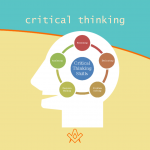 What is a critical thinker and what are their characteristics? |
 Share one personal skill Freemasonry helped you to improve? How can we make practical use of the lessons taught in Masonic writings? |
 An introduction to the art of public speaking - speak with confidence |
 Seven Liberal Arts and Sciences What do you know about Seven Liberal Arts and Sciences |
 Three Words That Will Change Your Life This article discuss a common situation found in many lodges - a difficulty in holding a conversation with a stranger. |
 Al - Khwarizmi live c750 - c820 is credited as being the father of Algebra, being asked what is Man, give his answer in an algebraic expression |
masonic knowledge
to be a better citizen of the world
share the square with two brothers

click image to open email app on mobile device


